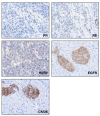Lack of evidence for KRAS oncogenic mutations in triple-negative breast cancer
- PMID: 20385028
- PMCID: PMC2868051
- DOI: 10.1186/1471-2407-10-136
Lack of evidence for KRAS oncogenic mutations in triple-negative breast cancer
Abstract
Background: Mutational analysis of the KRAS gene has recently been established as a complementary in vitro diagnostic tool for the identification of patients with colorectal cancer who will not benefit from anti-epidermal growth factor receptor (EGFR) therapies. Assessment of the mutation status of KRAS might also be of potential relevance in other EGFR-overexpressing tumors, such as those occurring in breast cancer. Although KRAS is mutated in only a minor fraction of breast tumors (5%), about 60% of the basal-like subtype express EGFR and, therefore could be targeted by EGFR inhibitors. We aimed to study the mutation frequency of KRAS in that subtype of breast tumors to provide a molecular basis for the evaluation of anti-EGFR therapies.
Methods: Total, genomic DNA was obtained from a group of 35 formalin-fixed paraffin-embedded, triple-negative breast tumor samples. Among these, 77.1% (27/35) were defined as basal-like by immunostaining specific for the established surrogate markers cytokeratin (CK) 5/6 and/or EGFR. KRAS mutational status was determined in the purified DNA samples by Real Time (RT)-PCR using primers specific for the detection of wild-type KRAS or the following seven oncogenic somatic mutations: Gly12Ala, Gly12Asp, Gly12Arg, Gly12Cys, Gly12Ser, Gly12Val and Gly13Asp.
Results: We found no evidence of KRAS oncogenic mutations in all analyzed tumors.
Conclusions: This study indicates that KRAS mutations are very infrequent in triple-negative breast tumors and that EGFR inhibitors may be of potential benefit in the treatment of basal-like breast tumors, which overexpress EGFR in about 60% of all cases.
Figures


References
-
- Sorlie T, Perou CM, Tibshirani R, Aas T, Geisler S, Johnsen H, Hastie T, Eisen MB, Rijn M van de, Jeffrey SS. Gene expression patterns of breast carcinomas distinguish tumor subclasses with clinical implications. Proceedings of the National Academy of Sciences of the United States of America. 2001;98(19):10869–10874. doi: 10.1073/pnas.191367098. - DOI - PMC - PubMed
Publication types
MeSH terms
Substances
LinkOut - more resources
Full Text Sources
Medical
Research Materials
Miscellaneous

